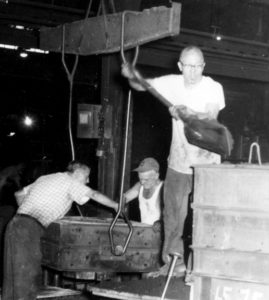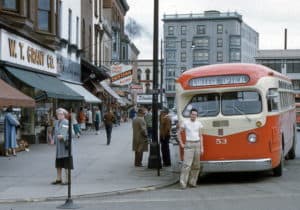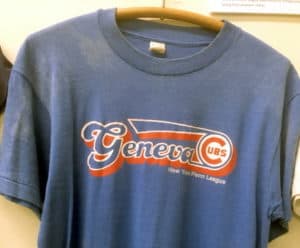A Brief History of the T-Shirt
By John Marks, Curator of Collections
Since the 1960s, T-shirts have been basic outerwear. A “plain white T” may cost several dollars at Walmart or close to $100 at the Neiman Marcus department store. There’s even a band called the Plain White T’s. As with many common items, the history of the T-shirt has been overlooked. The printed, or graphic, T-shirt has been underrated as a historical artifact.
Undergarments for both genders have always been part of clothing. Over time, they have become less constricting and more practical. The long-sleeved, one-piece union suit that covered the body from neck to ankles was patented in 1868. The suits were usually made of flannel or wool, and buttoned down the front. Eventually the suit was cut in half so one had the option of not wearing the bottoms.

John Kenney, right, working in the Geneva Foundry around 1950.
The modern short-sleeve, buttonless T-shirt was invented around 1900. The U.S. Navy began issuing them as undershirts in 1913. (F. Scott Fitzgerald created the phrase “T-shirt” in his 1920 novel, This Side of Paradise.) The white cotton shirts were lightweight, inexpensive, and easy to wash. They became popular anywhere that hot, dirty work needed to be done.
After 1945, World War II veterans began wearing T-shirts as outerwear. Marlon Brando and James Dean wore them as symbols of rebellion in A Streetcar Named Desire (1950) and Rebel Without a Cause (1955). Plain black or white T-shirts became part of “greaser” teenage culture, with slicked-back hair, jeans or twill pants, and sneakers.

Seneca Street looking east from Linden Street, May 1954
In the late 1950s, Tropix Togs had the rights to print Walt Disney characters on T-shirts. The Mickey Mouse shirt was, and remains, a bestseller. By the 1960s, screen printed T-shirts were everywhere, advertising everything from sports teams to college names. Rock concert T-shirts became a standard souvenir in the 1970s. Printed T-shirts became part of one’s identity.
The Geneva Historical Society has a small collection of printed T-shirts. Many of them are currently on display in our exhibit, All Things Geneva: Items from the Clothing Collection. The oldest are from the 1970s. There are some community events like Cruisin’ Night and Whale Watch, some sports teams, and a few Firemen’s Parade T-shirts that were made by Gallagher’s Irish Pub each year.

Geneva Cubs T-shirt, early 1980s
What’s missing? What T-shirts do you recall from the mid-1960s to the present? Did they represent a social message, a band, a team, or just a good time? If you have Geneva-related T-shirts you are willing to donate, please let us know!
All Things Geneva: Items from the Clothing Collection is on display at the Geneva History Museum through May 2. It includes women’s and men’s clothing made or sold in Geneva.
